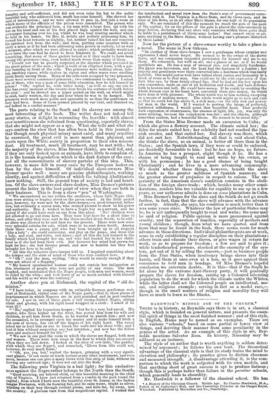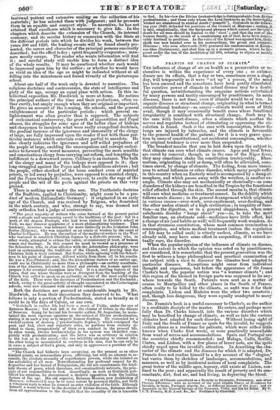HARDWICK'S MIDDLE AGE OF THE caunca.• THERE is in history,
as Reynolds says there is in art, a classical style, which is founded on general nature, and presents the essen- tial spirit of things in the most finished manner ; and of this style, in English, Hume may be named as an exemplar. There are also various "schools," based on some partial or lower view of things, and deriving their manner from some peculiarity in the genius of the artist. As an example of this style in art, Rey- nolds mentions Salvator Rosa. In history, Macaulay may be adduced as an instance.
The style of an author that is worth anything is seldom deter- mined by argument ; he follows his own bent. The theoretical advantage of the classical style is that its study trains the mind to elevation and philosophy ; its practice gives to diction closeness and measured strength. A disadvantage attending it, is the com- parison to which the work is subjected with its own models and that anything short of great success is apt to produce flatness; though this is perhaps better than failure in the peculiar schools which generally leads to absurdity. Mr. Hardwick is a follower of the classical school. He has • A History of the Christian Church. Middle Age. By Charles Hardwick, M.A., Fellow of St. Catherine's Hall, and late Cambridge Preacher at the Chapel Royal, Whitehall. Published by Macmillan and Co., Cambridge. bettowed -Patient and extensive reading on the collection of his materials ; he has selected them with judgment; and he presents them in an equable and compact style. In narrative, -he has not attained that excellence which is necessary to give life. In the chapters which describe the extension of the.Church, iteinternal economy, and its secular history or connexion with the State at the different periods into which he divides his work, between the years 590 and 1520, the leading events will be found dearly pre- sented, the career and character of the principal persons succinctly deseribed ; but the effect is dry ; spirit frequently evaporates ; man- ners mostly escape. The reader who wants information will find it ; and careful study will enable him to form a distinct idea of the whole results. It may be questioned whether such would be impressed upon him by the author; - or whether he would have as vivid an idea of the age as might be indicated -without at all falling into the minuteness and forced vivacity of the picturesque school.
About one half of the work only is devoted to narrative. The religions doctrines and controversies, the state of intelligence and piety of the age, occupy an equal place with action. Iii this in- tellectual exposition Mr. Hardwick is more at home. He notices the principal authors of the time and their productions, often ra- ther curtly, but amply enough when they are original or important. He gives an account of the learning, the schools, and the general enlightenment of the particular periods ; which general en- lightenment was often greater than is supposed. The subjects of ecclesiastical controversy, the growth of superstition and Papal abuses, the struggles for some ages of the better class of bishops • and clergymen to inculcate what were really evangelical doctrines, the gradual increase of the ignorance and immorality of the clergy at large, are fully impressed upon the reader if not with those par- ticular instances which entertain readers partial to anecdote. He also clearly indicates the ignorance and self-willed prejudices of the people at large, enabling the unscrupulous and corrupt ecclesi- astics to forward the worst measures, preventing the more sensible and conscientious clergy from carrying out reform, and tempting the indifferent to a downward course. Celibacy is an instance. The bulk of the clergy and many of the bishops were opposed to it; they long struggled against the Popes and their ambitious advisers ; but the people, either shocked at the loose conduct even of married priests, or led away by prejudice were opposed to a married clergy, and the Popes triumphed : soon:however, to excite the rage of the people and the wit of the poets against the priests on this very ground. - There is nothing new under the sun. The Pantheistic doctrine of the Budhists, applied to Christianity, might seem to be a pro- duct of 1M:dens Itationa,listic Germany : it originated in an early age of the Church, and was revived by Eri,gena, who flourished in the ninth century, and who, strange to say, was deemed not only orthodox but a judge of controversies. -
"The great majority of writers who come forward at the present period yield a simple and unreasoning assent to the traditions or the post': but in a work of the deacon Fredegis, who had been trained in Aleuin's school at York, we may discover symptoms a a more philosophizing tendency. That tendency, however. was betrayed far more distinctly in the Irishman John Scotus (Erigena), who was regarded as on oracle of wisdom by the court of Charles-le-Chauve. He was the earliest of the medireval writers in the West who ventured to establish Christian dogmas by a dialectic process ; who, in other words, attempted to evince the union, or contristency at least, of human reason and theology. In this respect he must be viewed as a precursor of the Schoolmen, who, in close alliance with the Aristotelian philosophy, were bent on systematizing the traditions of the Church, and. Proving that Use Christian faith is truly rational. But Scotus, while agreeing with the hoot- men in his point of departure, differed widely from them till in his results. He was a Neo-Platonist; and, like the Alexandrian doctors of in earlier age, could see in Christianity no more than a philosophy—an earthly manifesta- tion of the Absolute, intended to direct and elevate the human spirit and prepare it for eventual absorption into God. It is a startling feature of the times, that one whose theories were so divergent from the teaching of the Chinch was called to speak as an authority on two of the most awful topics of the faith. These were the doctrines of Predestination and the Eucharist ; which, owing to the great activity of thought engendered in the Carlovingian schools, were now discussed with unwonted vehemence?'
Both the doctrines are pursued at considerable length by Mr. Hardwick, as from their importance they deserved to be. What follows is only a portion of Predestination, stated as broadly as it could be in the days of Calvin, or our own.
" Gottskalk in earlier life had been a monk of Fulda, under the eye of Rabanus Maurus ; but had left it for the cloister of Orbais in the diocese of Sob/ions. Going far beyond his favourite author, St. Augustine, he main- tained the most rigorous opinions on the subject of Divine predestination, stating it in such a way as to imperil human freedom. He contended for a twofold system of decrees, (' priedestinatio duplex,') which consigned the good and bad, elect and reprobate alike, to portions from eternity al- lotted to them, irrespectively of their own conduct in the present life. In other words, Divine foreknowledge in his system was identified com- pletely with predestination; and the latter was as arbitrary in relation to the lost as to the saved,—the one infallibly attaining to eternal life ; the other being so necessitated to continue in his sins, that he can only be in name a subject of God's grace, and only in appearance a partaker of the sacraments.
"The Church had hitherto been occupying, on the present as on other kindred points, an intermediate place, affirming, but with no attempt to re- concile, the absolute necessity of superhuman powers, while she insisted on the saleability of all men. Notwithstanding her profound respect for St. Augustine and her hatred of Pelagianism, she did not countenance the fatal- istic theory of grace, whieh threatens, and constructively subverts, the prin- ciple of our responsibility to God. Accordingly, as BOOR as Gottskalk pub- lished his opinions, he encountered a decisive opposition from the leading doctors of the age. His old superior, Rabanus Maurits, now Ar4bishop of Mayenee, influenced it may be to some extent by personal dislike, put forth a vehement reply to what he deemed an utter violation of the filth. Although himself a warm believer in the doctrine of Divine decrees Rabanus shrank from all approximation to the thought that the causality of sin is traceable _ to God. In his view the Divine foreknowledgeis distinguiehahlefinnp tots; predestination ; and those only whom the-Lord foreknows aft_thedneorrigibly I wicked are abandoned to eternal death C prreseiti'). Gettskalk the- 1"ing year (848) defended his positions at the Council of Navel:lee ; stating, is said, emphatically, that the Scriptural phrases which record our Saviour s death for all men should be limited to the elect' ; and- thatthe rest of the human family, as the result of a constraining act of God, have,beenirrevo- cably destined to perdition. As the voice of the Synod was against him, Gott- slcalk was now handed over to his metropolitan, the proud and energetic Ilincmar ; who soon afterwards (849) procured his condemnation at /Kiersy. sur-Oise (Carisia cure), and shut him up in a monastic prison, where he lin- gered under the ban of the Archbishop till 868, refusing to abjure or modify his errors."



























 Previous page
Previous page